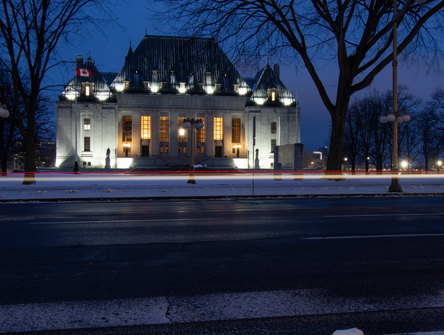Be it resolved: Resolutions from the 2021 CBA Annual General Meeting
Climate justice resolution causes animated debate on the role and mandate of the CBA.

Four resolutions came up for a vote at the 2021 all-virtual AGM. The most hotly debated one was a call for the CBA to adopt a definition of climate justice that would recognize the profession’s responsibility in helping shape law reform policies in Canada. It was ultimately defeated.
Before the AGM, the climate justice resolution had generated significant interest. Members opposed to it argued it was far beyond the scope of the CBA and unnecessarily divisive. Steve Major wrote that “the proponent’s definition of ‘Climate Justice’ is nebulous, verbose, and open to a multitude of interpretations and meanings...” The CBA, Major added, “should not be subject to the political pressures of the day.”
The mover of the resolution, Meredith James, defended the resolution arguing “the CBA’s Legislation and Law Reform Committee’s mandate is to pursue ‘improvements in the law and the legal system that reflect the CBA’s commitment to the Rule of Law, the Charter of Rights and Freedoms, and fundamental human rights.’”
The climate crisis “will affect you personally, wherever you live in Canada,” intoned Matt Hulse, who seconded the resolution, adding that what is needed goes beyond voting on a resolution. “We need an ongoing process,” he said.
Brian Hebert, Chair of CBA’s Aboriginal Law Section, could not fathom “why we as lawyers wouldn’t support this,” pointing out that the threat of division should not prevent adopting the resolution. The American Bar Association, he said, has over 400,000 members, yet they passed a similar resolution two years ago. “We might try to ignore climate change, but it’s happening all around us,” he warned.
Many of the members who spoke against the resolution made it clear that they believed climate change to be an emergency. However, as Ranjan Agarwal pointed out, “we risk injuring ourselves with divisive resolutions like that,” in part by driving away new members who might see the CBA “as an organization that has a social agenda.”
There was far less disagreement over a proposed amendment to CBA bylaws to amend the definition of diversity to include religious groups, which was adopted.
However, it did invite a cautionary note from Toronto lawyer Omar Ha-Redeye that we should guard against inadvertently creating more exclusion, specifically with regards to some religious beliefs that can at times be used to tolerate forms of sexism or homophobia.
A resolution on improving long-term care and support for older Canadians, sponsored by the Elder Law Section, also passed. It calls on the CBA to urge governments to fast-track the establishment of national quality standards in long-term care, and create a pan-Canadian elder abuse strategy, among other measures.
The CBA adopted another resolution, introduced by Jody Berkes on behalf of the Criminal Justice Section, calling on the government to eliminate mandatory sentences.
The CBA’s Policy Committee had accepted a late resolution condemning the use of Hong Kong’s National Security Law, but it was tabled due to insufficient time.


